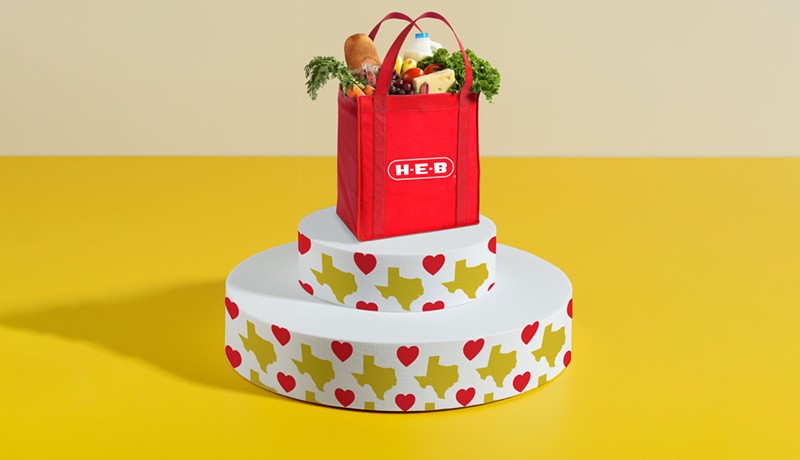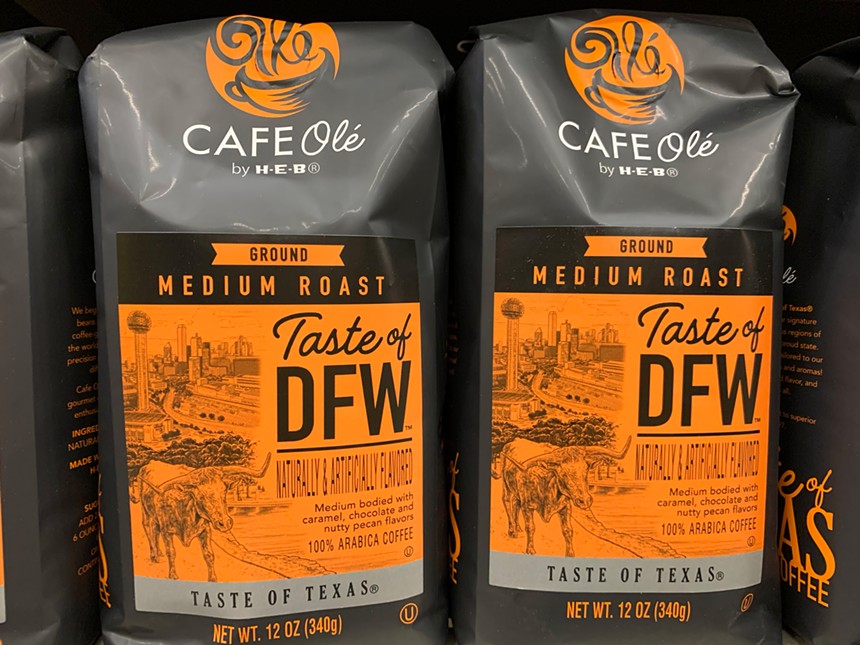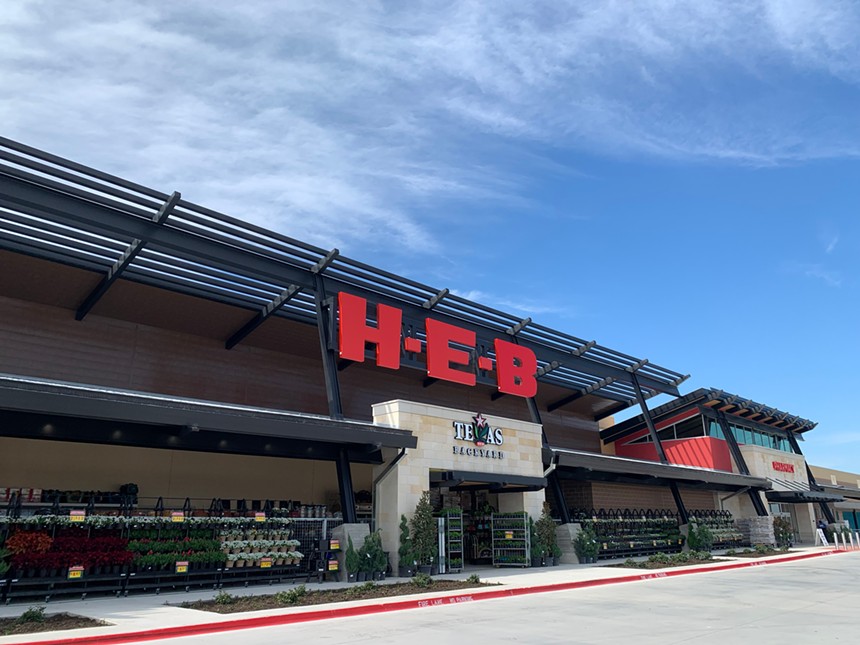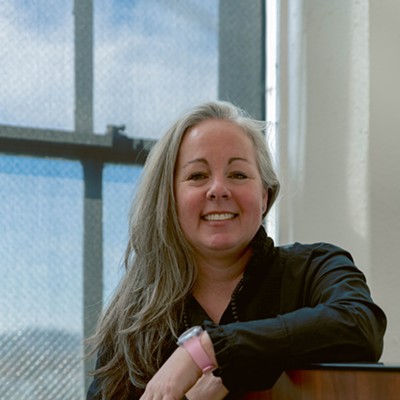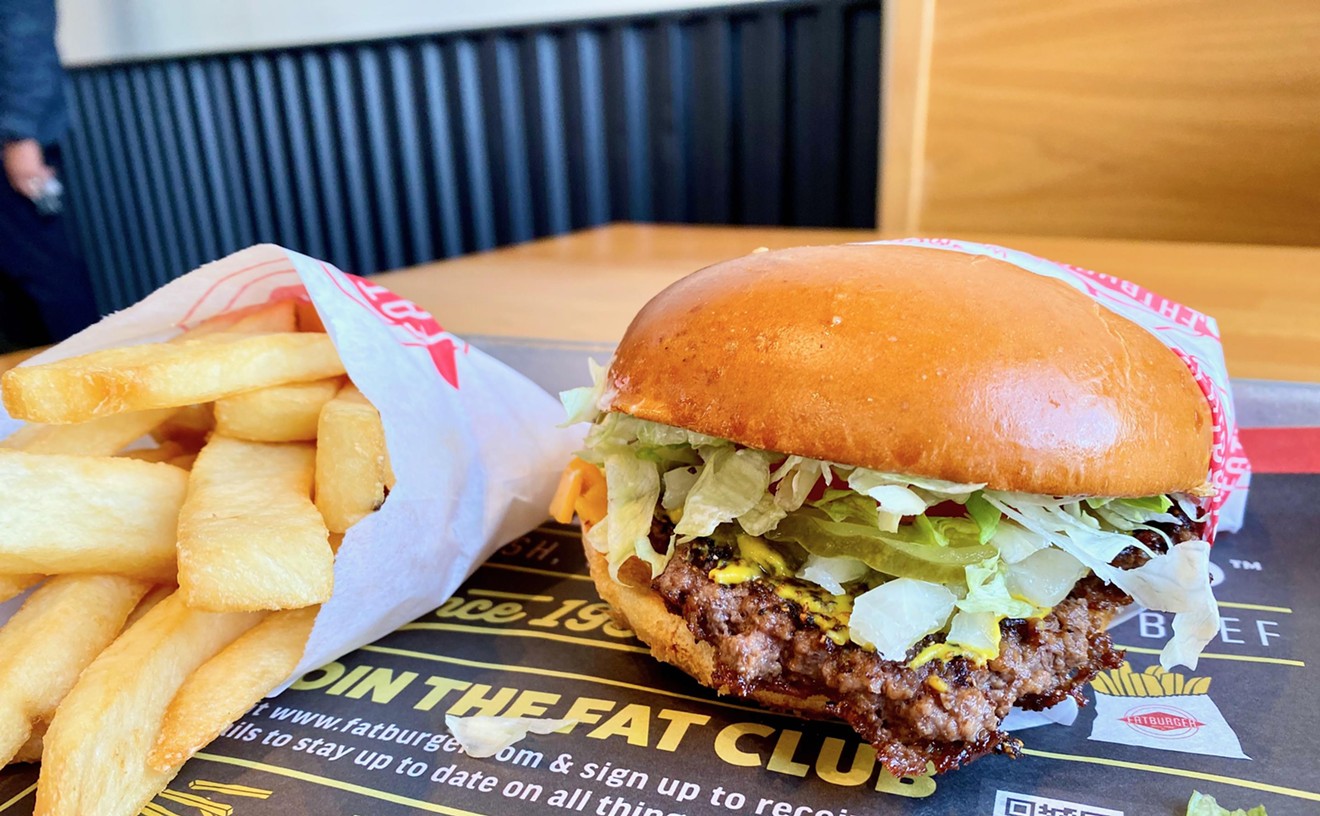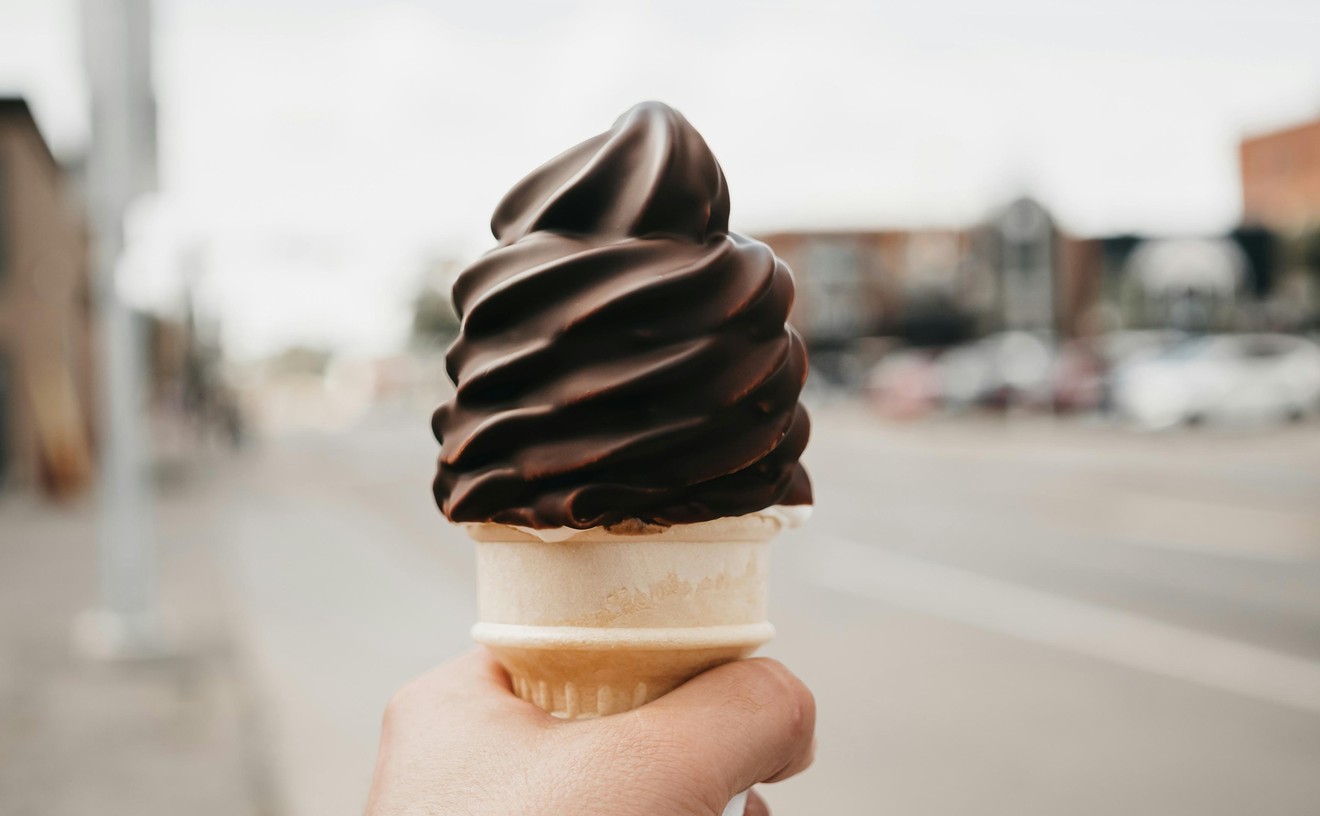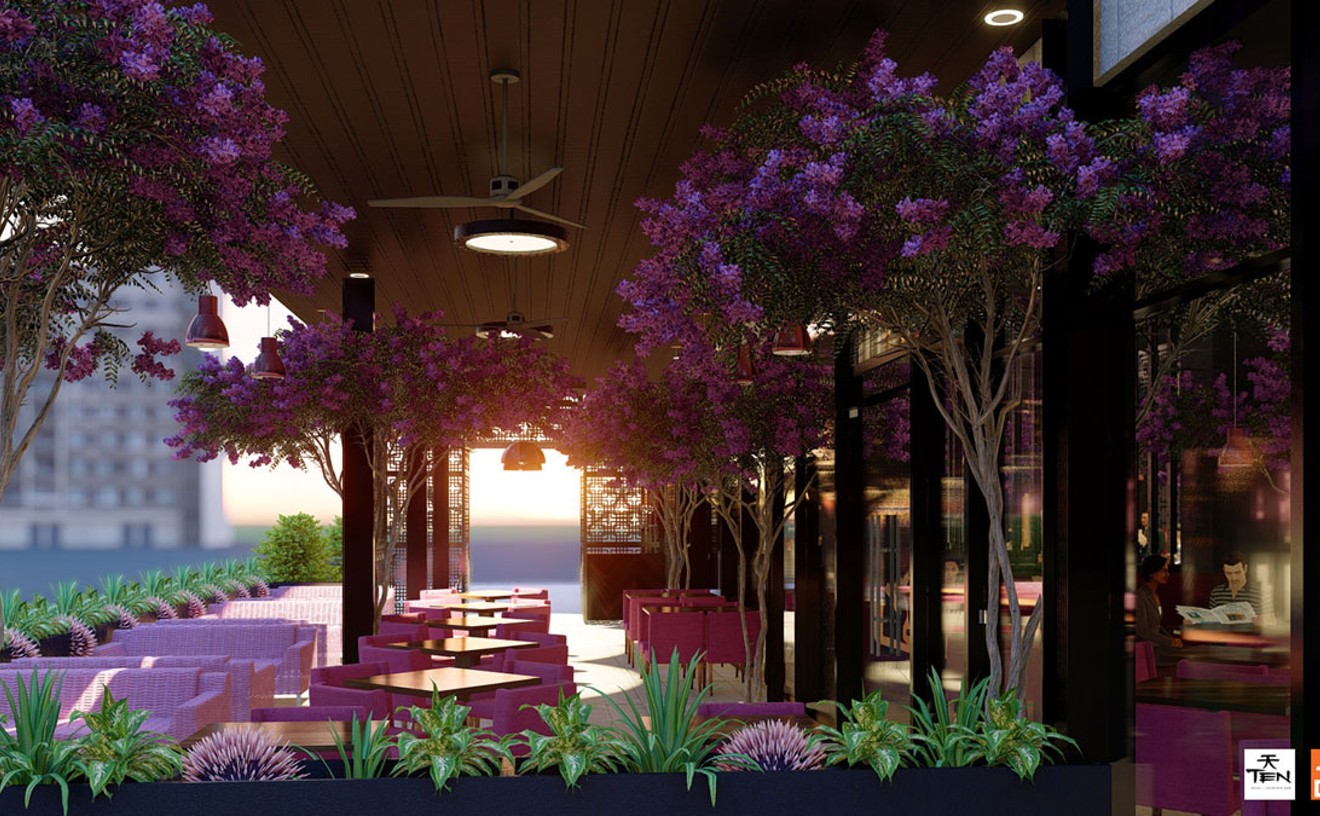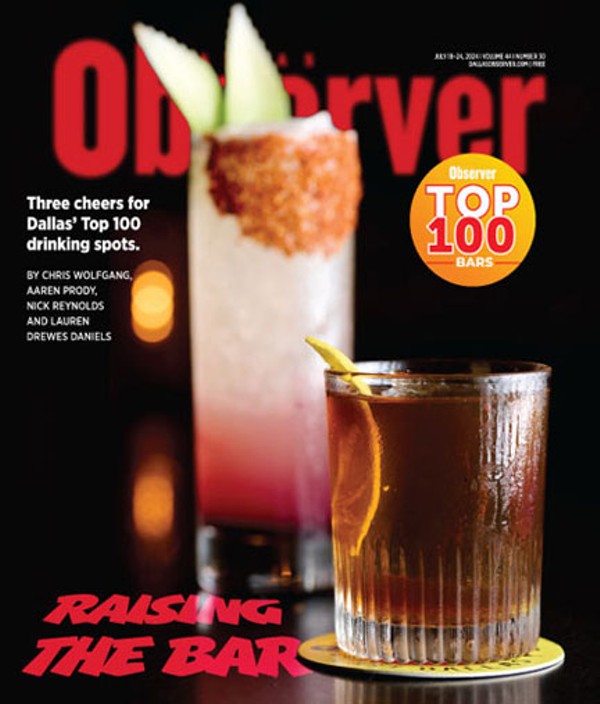No specific product drop sent social media feeds into a frenzy. No big-name celebrity endorsement catapulted H-E-B into the stratosphere. The rise of the Texas grocery store chain, named for the founder’s son, Howard E. Butt, was more of a slow evolution, like churning butter on a porch.
That stardom was most recently evident when a new store opened in the North Texas suburb of Frisco. For years, the nearest H-E-B was south of Dallas in Waxahachie. This new spot was the first store to feed the north side of the Dallas area.
Claudia Kist and Tommy Trogden created the North Texas H-E-B Fanatics Facebook page soon after H-E-B filed plans with the zoning board in Plano, where the company opened its second store north of Dallas this month. The page's 8,300 members ask about wait times at stores and share best finds.
“H-E-B has been an unofficial part of my family,” Trogden recently told the Observer. “Growing up in San Antonio, something from the store was at every birthday and every holiday. When we moved to the Dallas area, we were longing for H-E-B to make its way up here.”
The night before the grand opening in Frisco on Sept. 21, people camped out at the front door. By the time the store opened, lines wrapped around the building. Days later there were still lines out the door, even during a Cowboys game on a Sunday afternoon, typically an ideal time for shoppers to avoid busy aisles.
But why? This is America, where abundant produce and no queues played a role in the nation's victory in the Cold War after Soviet leader Boris Yelstin visited a Randall's supermarket near Houston in 1989. Who in their right mind would battle the traffic, the parking lot and congested aisles all for groceries ... after they waited in line? A Category 4 hurricane wasn’t barreling toward us; there was no need to stock up on toilet paper, hotdogs and boxed wine. There’d been no warnings of a winter storm shutting down the city or electrical grid. What is it about a grocery store that stokes fan groups on Facebook, lines for days and an allegiance thicker than brisket queso?
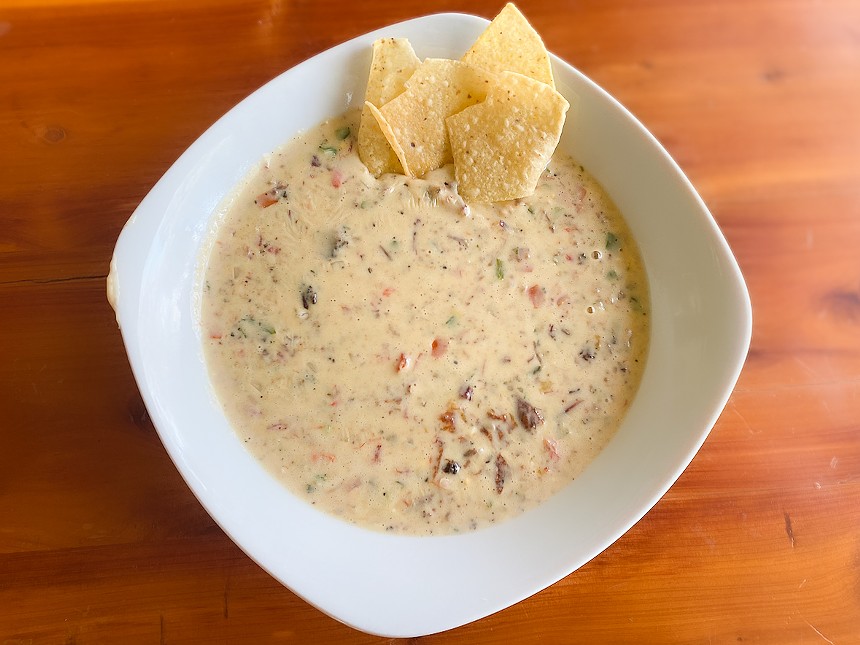
The brisket queso has yellow and orange cheeses, smoked brisket and pico de galllo.
Lauren Drewes Daniels
Case in point: The week after Hurricane Harvey inundated the Houston area with flooding in 2017, reporter Chip Cutter (who is now with the Wall Street Journal but at the time was reporting for LinkedIn) interviewed Scott McClelland, then a 27-year H-E-B veteran and president of the grocery stores’ Houston division.
Cutter's story of the company’s response is a fascinating display of ingenuity and chutzpah. H-E-B had 83 stores throughout the Houston area and managed to open 60 of them just hours after the hurricane hit. Many workers were displaced by flooding, however, including truck drivers who were needed to move goods. So, H-E-B, as McClelland tells it, used helicopters to fly drivers over from San Antonio to Houston. Others, who worked at stores in San Antonio, drove to the area to help out.
McClelland called toilet paper manufacturers with instructions to bypass distribution centers and make deliveries directly to stores. They stopped baking their usual 50 varieties of bread and instead concentrated on three essentials: white, wheat and hotdog buns. They dispatched full-blown mobile kitchens capable of feeding 2,000 people an hour. McClelland said H-E-B often arrives at disaster areas before the Red Cross.
But that’s nothing. In 2005, after Hurricane Rita, a Category 3 storm that skated along the eastern edge of the state, McClelland needed to clean stores filled with rotting foods. But he knew FEMA officials, already in place, wouldn’t let his teams in. So, he wrote a letter on his own letterhead, signed it and got three busses for his workers. Then he put a flashing blue light on top of a Cadillac Escalade. He told his crew to just drive to the store. When they were stopped at a checkpoint, they handed over McClelland’s letter. It worked. The police let them in.
“We kind of coined the phrase fake it 'til you make it. That's the way we go about handling natural disasters. We'll do whatever it takes,” McClelland told Cutter.
Then in January 2020, just when there were rumblings of a virus spreading on the other side of the world — COVID-19 — H-E-B didn’t wait for guidance from the government. Texas Monthly reported the company started running simulations with their Chinese counterparts in January before many of us even knew what would hit us.
In 2020 after winter storm Uri left thousands freezing and powerless across the state, H-E-B was once again a pillar, providing essentials while the state government floundered. In one case, the lights went out inside an H-E-B in Leander. Anxious shoppers, who were stocking up on essentials, headed to the front of the store with full carts. A post on Twitter, and later confirmed by H-E-B, explained that workers checked baskets for alcohol, and allowed all others to just leave with carts full of groceries. For free.
During that time, Greg Jefferson with the San Antonio Express-News called H-E-B a “de facto arm of government.”
Perhaps most importantly, the Butt family donated $10 million to help build a new elementary campus in Uvalde following the school shooting in May 2022 that left 19 students and two teachers dead and 17 others wounded. They also donated another $500,000 for the victims and their families, and $500,000 to support the nonprofits helping the residents of Uvalde.
How Did H-E-B Get to This Point?
For decades — since its original opening in Kerrville in 1905 — H-E-B was just a neighborhood grocery store.Leigh McAlister is a professor of business marketing at the University of Texas at Austin and an executive director of the Marketing Science Institute. She said H-E-B has one advantage when it comes to gaining its rock-star-like status: it's privately owned, giving it more freedom to innovate. Early innovation and "productivity gains" like electronic scanners, McAlister pointed out, lower the chain's costs, drawing more customers and feeding a "productivity loop" that encourages more innovation, giving H-E-B a continual competitive edge.
McAlister cites the example of fresh produce, something H-E-B is known for, with its emphasis on Texas-grown food. Innovation has allowed H-E-B to lower prices, drawing in more customers, which means it sells more fresh produce, turning product over more quickly so that “the fresh stuff is ‘fresher.’”
Innovation needs talent to implement it, and McAlister noted that 25 years ago, H-E-B was on the UT campus “fighting for our highest-performing MBA students and offering top MBA salaries.” She said she thinks it also recruited talent at Harvard, the University of Virginia and other top MBA programs.
“At the same time, other retailers,” McAlister said, “if they even bothered to recruit on campus, were asking me for my 'lower-cost,' 'C students' in the undergraduate program.”
McClelland, who put the blue light on top of an Escalade after the hurricane, graduated from Harvard’s Advancement Management Program.
H-E-B consistently ranks at or near the top on Dunnhumby’s Retailer Preference Index. In 2021 it was ranked No. 2 among national grocery store chains. In 2020 it was ranked No. 1; the company celebrated by giving each of its employees a $100 bonus. The report highlights the company’s strategic superiority and a strong balance of great price and perceived quality, “driven by its best-in-class private brand while also making improvements during COVID in digital.”
Why Not Dallas?
As far as extending the love to Dallas, that’s a complicated question with an even more complicated answer. Today, H-E-B has stores in Burleson, Waxahachie, Frisco and Plano, with stores planned for Mansfield, McKinney, Allen and north Fort Worth. There are three Central Markets, H-E-B’s upscale sister store, on the north side of Dallas in addition to stores in Fort Worth, Southlake and Plano. McAlister said she’s “heard that the Dallas market is ‘over-stored,’” meaning the grocery stores currently in Dallas more than cover the demand for groceries. But she also recognizes that food deserts, places where people lack access to healthy food options within a 5-mile radius of their homes, are a huge problem.
In January the Observer reported on the city’s efforts to lure grocers to southern Dallas, which has areas that are considered food deserts. Around that time, the City’s Economic Development Committee met to discuss why they can’t get grocers to Dallas’ most underserved communities. At the meeting, they heard from Gary Huddleston, the Texas Retailers Association’s grocery store consultant. (We reached out to him for comments about H-E-B’s current play in the area, but he was unable to comment on H-E-B specifically because the association represents several retailers.) In January, though, he told the city that the market is “extremely, extremely competitive” and a difficult business with profit margins between 1% and 2% of sales.
“The bottom line is there’s got to be some thought that at some point the store is going to be profitable," he said. "We want to serve the community, but it’s still got to make a profit.”
Which is a hard pill to swallow when Kroger’s net income for 2021 was $2.6 billion, and Albertsons was planning a $4 billion dividend payout this year. The companies didn't make that money by shoving stores into unprofitable locations. And no company is obligated to any geographical area or purpose.
Huddleston was not speaking about H-E-B specifically, and as McAlister pointed out, the chain is privately held, unlike Kroger and Albertsons, which went public in 2020. Investors aren’t breathing down H-E-B's necks every day for immediate returns, which has helped grow its model to what it is today and contributed to the company's $38 billion in annual sales. The Butt family is one of the richest in the state; Bloomberg reports Charles Butt and family are worth $10.8 billion and rank No. 154 on the Bloomberg Billionaires Index. Forbes values H-E-B at just over $17 billion.
Still, it's not as if H-E-B is shunning Dallas or even its southern neighborhoods. The company purchased a five-acre site in southern Dallas that includes a shuttered Albertsons on West Wheatland Road near Highway 67, just south of Interstate 20. But the company has long bought property around DFW to hold while it watches how the market and city develop. For instance, it also owns property on Lemmon Avenue.
And the company is well aware of the calls coming from Dallas leaders for someone, anyone, to bring stores to Dallas' food deserts in the south. In reporting this story, we emailed H-E-B for an updated response on plans for the location on Wheatland Road. Now that Plano and Frisco were opened, were they anywhere closer to announcing a store in southern Dallas? We asked if they have plans for a grocery store at that site. H-E-B's senior director of public affairs, Mabrie Jackson, responded, “We do. I look forward to sharing a date in the future."
We considered that a direct answer to a direct question, one that differed from H-E-B's previous responses when asked about its plans for the Wheatland Road site. “We recently purchased property in the southern sector of Dallas County in anticipation of future growth. No construction date has been set,” Jackson told The Dallas Morning News in January after the purchase.
Since then, the company has been mum on its plans for the site, so the subtle shift from "anticipation for future growth" to a positive statement that H-E-B plans to build there seemed significant, and the Observer immediately posted a story about the comment online ... and quickly got a phone call from Jackson requesting we take the story down. Her phone was blowing up with calls from other media outlets and at least one City Council member asking if they’d missed a press release. She said that what she meant to communicate was something akin to her comment back in January. But the question remained, as did the answer. When pressed, Jackson said they do plan on putting a store there, they just didn’t know when. That in itself is big news. This would place the grocer popular for its price-to-quality factor in an area of the city where it is desperately needed.
Will it be in one, five or 10 years? They’re not saying. And we likely won’t get the press release now.
Either way, with stores near — but not in — Dallas, North Texans can still get their brisket queso or warm buttery tortillas. And if we get another ice storm or any number of unfortunate incidents, we know we have a new neighbor, a bit closer than before, whom we can count on to provide us with our essentials, come ice or high water. Just watch for the Escalade with the flashing blue light on top.

